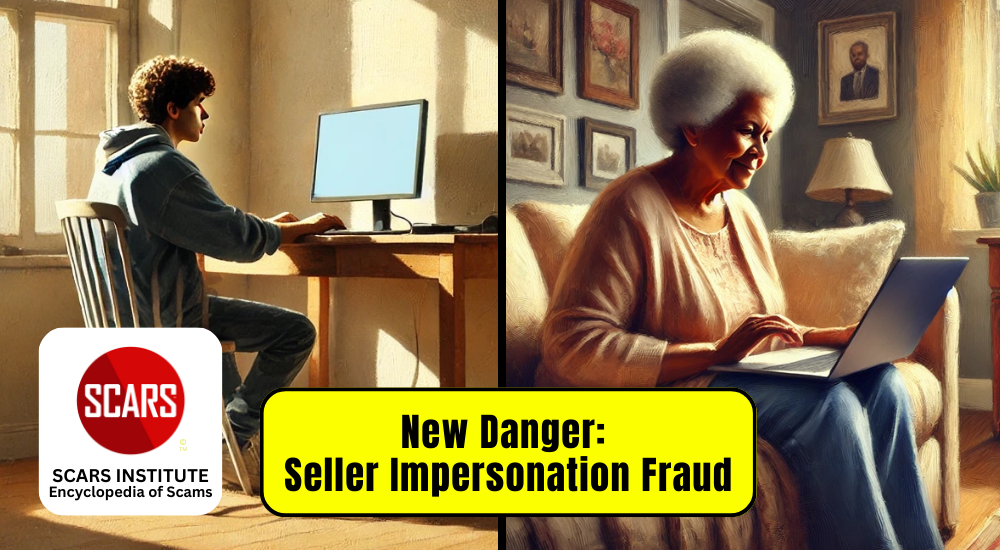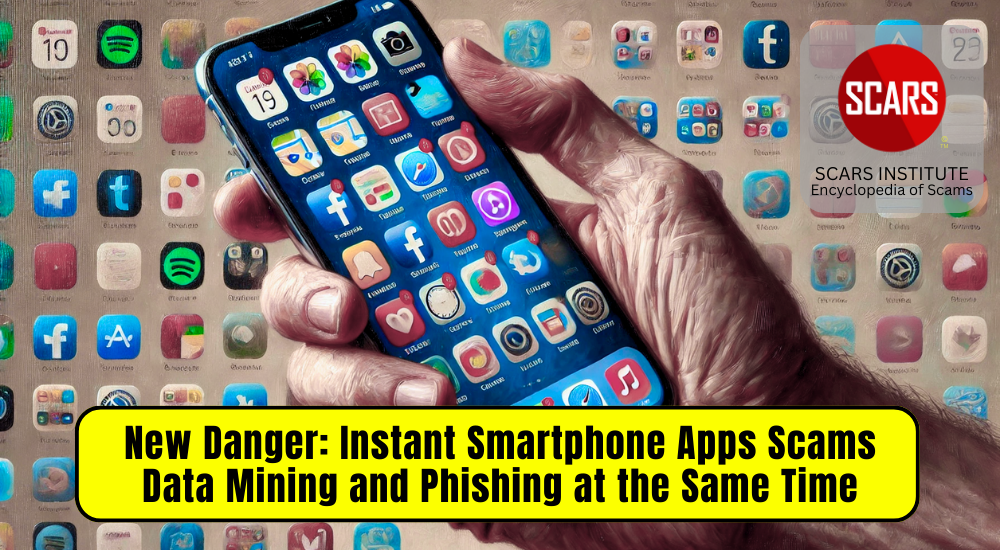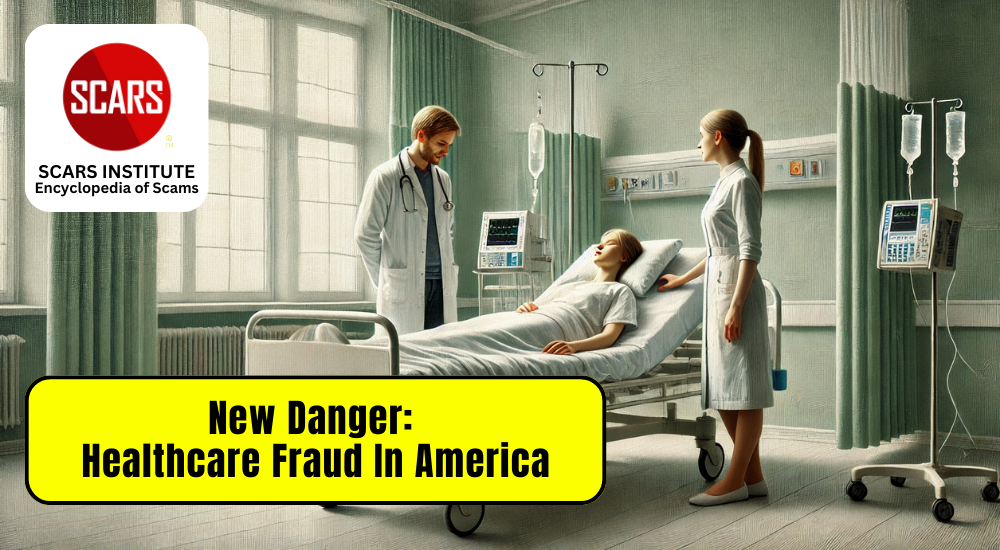
SCARS Institute’s Encyclopedia of Scams™ Published Continuously for 25 Years

Healthcare (Health Care) Fraud in the United States
Catalog of Scams – A SCARS Institute Insight
Author:
• SCARS Institute Encyclopedia of Scams Editorial Team – Society of Citizens Against Relationship Scams Inc.
Article Abstract
Healthcare fraud in the United States is a serious and costly crime that affects individuals, businesses, and government programs alike. It involves deliberate deception by medical providers, patients, or others to obtain unauthorized payments or benefits. Common provider fraud includes double billing, phantom billing for services never rendered, upcoding, and unbundling charges. Patients may commit fraud through identity theft, allowing others to use their insurance, or engaging in bogus marketing schemes.
Prescription fraud—such as forging prescriptions, doctor shopping, or selling medications—poses especially high human costs, contributing to widespread addiction and thousands of deaths annually. The financial toll is staggering, with tens of billions of dollars lost each year, leading to higher insurance premiums, increased taxes, and unnecessary medical risks. To combat this, the FBI leads healthcare fraud investigations in coordination with various agencies and private partners. Individuals are encouraged to protect their health insurance information, be wary of “free” services, and regularly review their explanation of benefits for accuracy.

FBI PODCAST About Healthcare Fraud
On this episode of Inside the FBI, learn why health care fraud isn’t a victimless crime and how we’re fighting back to keep Americans safe.
Healthcare (Health Care) Fraud in the United States
Healthcare fraud can be committed by medical providers, patients, and others who intentionally deceive the healthcare system to receive illegal benefits or payments.
Healthcare fraud is not a victimless crime.
It affects everyone—individuals and businesses alike—and causes tens of billions of dollars in losses each year. It can raise health insurance premiums, expose you to unnecessary medical procedures, and increase taxes.
The FBI is the primary agency for investigating health care fraud for both federal and private insurance programs.
The FBI investigates these crimes in partnership with:
- Federal, state, and local agencies
- Healthcare Fraud Prevention Partnership
- Insurance groups such as the National Health Care Anti-Fraud Association, the National Insurance Crime Bureau, and insurance investigative units
Report Health Care Fraud
Visit ic3.gov, the FBI’s Internet Crime Complaint Center (IC3), to report health care fraud. Also report to the FTC – visit reporting.AgainstScams.org to learn how.
Common Types of Health Care Fraud
Fraud Committed by Medical Providers
-
- Double billing: Submitting multiple claims for the same service
- Phantom billing: Billing for a service visit or supplies the patient never received
- Unbundling: Submitting multiple bills for the same service
- Upcoding: Billing for a more expensive service than the patient actually received
Fraud Committed by Patients and Other Individuals
-
- Bogus marketing: Convincing people to provide their health insurance identification number and other personal information to bill for non-rendered services, steal their identity, or enroll them in a fake benefit plan
- Identity theft/identity swapping: Using another person’s health insurance or allowing another person to use your insurance
- Impersonating a health care professional: Providing or billing for health services or equipment without a license
Fraud Involving Prescriptions
-
- Forgery: Creating or using forged prescriptions
- Diversion: Diverting legal prescriptions for illegal uses, such as selling your prescription medication
- Doctor shopping: Visiting multiple providers to get prescriptions for controlled substances or getting prescriptions from medical offices that engage in unethical practices
Prescription Medication Abuse
Creating or using forged prescriptions is a crime, and prescription fraud comes at an enormous cost to physicians, hospitals, insurers, and taxpayers. But the greatest cost is a human one—tens of thousands of lives are lost to addiction each year. Protect yourself and your loved ones by following this guidance:
- If you are taking opioids, take them exactly as prescribed by your doctor, ideally, for the shortest amount of time possible.
- Never share your medication with others.
- Explore non-opioid options with your doctor.
- Learn more about the risks of opioid use from the CDC.
- If you have unused or expired pain medications, take them to a DEA-approved take back site for disposal.
Protect Yourself
- Protect your health insurance information. Treat it like a credit card. Don’t give it to others to use, and be mindful when using it at the doctor’s office or pharmacy.
- Beware of “free” services. If you’re asked to provide your health insurance information for a “free” service, the service is probably not free and could be fraudulently charged to your insurance company.
- Check your explanation of benefits (EOB) regularly. Make sure the dates, locations, and services billed match what you actually received. If there’s a concern, contact your health insurance provider.
-/ 30 /-
What do you think about this?
Please share your thoughts in a comment below!
LEAVE A COMMENT?
Recent Comments
On Other Articles
- Arwyn Lautenschlager on Love Bombing And How Romance Scam Victims Are Forced To Feel: “I was love bombed to the point that I would do just about anything for the scammer(s). I was told…” Feb 11, 14:24
- on Dani Daniels (Kira Lee Orsag): Another Scammer’s Favorite: “You provide a valuable service! I wish more people knew about it!” Feb 10, 15:05
- on Danielle Delaunay/Danielle Genevieve – Stolen Identity/Stolen Photos – Impersonation Victim UPDATED 2024: “We highly recommend that you simply turn away form the scam and scammers, and focus on the development of a…” Feb 4, 19:47
- on The Art Of Deception: The Fundamental Principals Of Successful Deceptions – 2024: “I experienced many of the deceptive tactics that romance scammers use. I was told various stories of hardship and why…” Feb 4, 15:27
- on Danielle Delaunay/Danielle Genevieve – Stolen Identity/Stolen Photos – Impersonation Victim UPDATED 2024: “Yes, I’m in that exact situation also. “Danielle” has seriously scammed me for 3 years now. “She” (he) doesn’t know…” Feb 4, 14:58
- on An Essay on Justice and Money Recovery – 2026: “you are so right I accidentally clicked on online justice I signed an agreement for 12k upfront but cd only…” Feb 3, 08:16
- on The SCARS Institute Top 50 Celebrity Impersonation Scams – 2025: “Quora has had visits from scammers pretending to be Keanu Reeves and Paul McCartney in 2025 and 2026.” Jan 27, 17:45
- on Scam Victims Should Limit Their Exposure To Scam News & Scammer Photos: “I used to look at scammers photos all the time; however, I don’t feel the need to do it anymore.…” Jan 26, 23:19
- on After A Scam, No One Can Tell You How You Will React: “This article was very informative, my scams happened 5 years ago; however, l do remember several of those emotions and/or…” Jan 23, 17:17
- on Situational Awareness and How Trauma Makes Scam Victims Less Safe – 2024: “I need to be more observant and I am practicing situational awareness. I’m saving this article to remind me of…” Jan 21, 22:55
ARTICLE META
Important Information for New Scam Victims
- Please visit www.ScamVictimsSupport.org – a SCARS Website for New Scam Victims & Sextortion Victims
- Enroll in FREE SCARS Scam Survivor’s School now at www.SCARSeducation.org
- Please visit www.ScamPsychology.org – to more fully understand the psychological concepts involved in scams and scam victim recovery
If you are looking for local trauma counselors please visit counseling.AgainstScams.org or join SCARS for our counseling/therapy benefit: membership.AgainstScams.org
If you need to speak with someone now, you can dial 988 or find phone numbers for crisis hotlines all around the world here: www.opencounseling.com/suicide-hotlines
A Note About Labeling!
We often use the term ‘scam victim’ in our articles, but this is a convenience to help those searching for information in search engines like Google. It is just a convenience and has no deeper meaning. If you have come through such an experience, YOU are a Survivor! It was not your fault. You are not alone! Axios!
A Question of Trust
At the SCARS Institute, we invite you to do your own research on the topics we speak about and publish, Our team investigates the subject being discussed, especially when it comes to understanding the scam victims-survivors experience. You can do Google searches but in many cases, you will have to wade through scientific papers and studies. However, remember that biases and perspectives matter and influence the outcome. Regardless, we encourage you to explore these topics as thoroughly as you can for your own awareness.
Statement About Victim Blaming
SCARS Institute articles examine different aspects of the scam victim experience, as well as those who may have been secondary victims. This work focuses on understanding victimization through the science of victimology, including common psychological and behavioral responses. The purpose is to help victims and survivors understand why these crimes occurred, reduce shame and self-blame, strengthen recovery programs and victim opportunities, and lower the risk of future victimization.
At times, these discussions may sound uncomfortable, overwhelming, or may be mistaken for blame. They are not. Scam victims are never blamed. Our goal is to explain the mechanisms of deception and the human responses that scammers exploit, and the processes that occur after the scam ends, so victims can better understand what happened to them and why it felt convincing at the time, and what the path looks like going forward.
Articles that address the psychology, neurology, physiology, and other characteristics of scams and the victim experience recognize that all people share cognitive and emotional traits that can be manipulated under the right conditions. These characteristics are not flaws. They are normal human functions that criminals deliberately exploit. Victims typically have little awareness of these mechanisms while a scam is unfolding and a very limited ability to control them. Awareness often comes only after the harm has occurred.
By explaining these processes, these articles help victims make sense of their experiences, understand common post-scam reactions, and identify ways to protect themselves moving forward. This knowledge supports recovery by replacing confusion and self-blame with clarity, context, and self-compassion.
Additional educational material on these topics is available at ScamPsychology.org – ScamsNOW.com and other SCARS Institute websites.
Psychology Disclaimer:
All articles about psychology and the human brain on this website are for information & education only
The information provided in this article is intended for educational and self-help purposes only and should not be construed as a substitute for professional therapy or counseling.
While any self-help techniques outlined herein may be beneficial for scam victims seeking to recover from their experience and move towards recovery, it is important to consult with a qualified mental health professional before initiating any course of action. Each individual’s experience and needs are unique, and what works for one person may not be suitable for another.
Additionally, any approach may not be appropriate for individuals with certain pre-existing mental health conditions or trauma histories. It is advisable to seek guidance from a licensed therapist or counselor who can provide personalized support, guidance, and treatment tailored to your specific needs.
If you are experiencing significant distress or emotional difficulties related to a scam or other traumatic event, please consult your doctor or mental health provider for appropriate care and support.
Also read our SCARS Institute Statement about Professional Care for Scam Victims – click here to go to our ScamsNOW.com website.
















Thank you for your comment. You may receive an email to follow up. We never share your data with marketers.